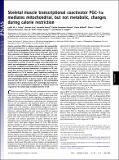Skeletal muscle transcriptional coactivator PGC-1α mediates mitochondrial, but not metabolic, changes during calorie restriction
Author(s)
Finley, Lydia W. S.; Lee, Jaewon; Souza, Amanda; Desquiret-Dumas, Valérie; Bullock, Kevin; Rowe, Glenn C.; Procaccio, Vincent; Clish, Clary; Arany, Zoltan; Haigis, Marcia C.; ... Show more Show less
DownloadFinley-2012-Skeletal muscle tran.pdf (912.4Kb)
PUBLISHER_POLICY
Publisher Policy
Article is made available in accordance with the publisher's policy and may be subject to US copyright law. Please refer to the publisher's site for terms of use.
Terms of use
Metadata
Show full item recordAbstract
Calorie restriction (CR) is a dietary intervention that extends lifespan and healthspan in a variety of organisms. CR improves mitochondrial energy production, fuel oxidation, and reactive oxygen species (ROS) scavenging in skeletal muscle and other tissues, and these processes are thought to be critical to the benefits of CR. PGC-1α is a transcriptional coactivator that regulates mitochondrial function and is induced by CR. Consequently, many of the mitochondrial and metabolic benefits of CR are attributed to increased PGC-1α activity. To test this model, we examined the metabolic and mitochondrial response to CR in mice lacking skeletal muscle PGC-1α (MKO). Surprisingly, MKO mice demonstrated a normal improvement in glucose homeostasis in response to CR, indicating that skeletal muscle PGC-1α is dispensable for the whole-body benefits of CR. In contrast, gene expression profiling and electron microscopy (EM) demonstrated that PGC-1α is required for the full CR-induced increases in mitochondrial gene expression and mitochondrial density in skeletal muscle. These results demonstrate that PGC-1α is a major regulator of the mitochondrial response to CR in skeletal muscle, but surprisingly show that neither PGC-1α nor mitochondrial biogenesis in skeletal muscle are required for the whole-body metabolic benefits of CR.
Date issued
2012-02Department
Koch Institute for Integrative Cancer Research at MITJournal
Proceedings of the National Academy of Sciences
Publisher
National Academy of Sciences
Citation
Finley, L. W. S. et al. “Skeletal Muscle Transcriptional Coactivator PGC-1 Mediates Mitochondrial, but Not Metabolic, Changes During Calorie Restriction.” Proceedings of the National Academy of Sciences 109.8 (2012): 2931–2936. Copyright ©2012 by the National Academy of Sciences
Version: Final published version
ISSN
0027-8424
1091-6490